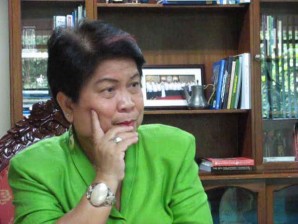MANILA, Philippines—The Department of Social Welfare and Development handed Thursday P149,700 in cash grants to 152 initial beneficiaries of the Expanded Conditional Cash Transfer (ECCT) project for street families.
Social Welfare and Development Secretary Dinky Soliman and Manila Mayor Alfredo Lim witnessed the initial pay-out at the San Andres Sports Complex in Malate, Manila.
The beneficiaries from Manila were part of the 700 street families in Metro Manila, which have been targeted for inclusion in the program, also known as Pantawid Pamilyang Pilipino Program (4Ps), an anti-poverty program of the government to keep children up to 14 years in school and improve their well being and health.
As of August 14, some 436 street families have been registered for the project. They were chosen based on a set of criteria such as families living on the streets, sidewalks, pavements, open spaces for at least three months, blood relatives with children 0-14 years old, and families willing to commit to meet the conditions.
Soliman said these families were validated by the National Household Targeting Office of DSWD-NCR from June to July 2012. They were made to attend an orientation on the ECCT conducted by a social worker in Amoranto, Quezon City.
Under the 4Ps, a household beneficiary with up to three children receives cash grants of P1,400 per month. The cash grants are given on a monthly basis while undergoing case management and preparing them for mainstreaming to the regular Pantawid Pamilya program.
Under the ECCT project, qualified beneficiaries will not only receive cash grants but a complete package of assistance to include housing assistance with access to social services and economic opportunities for the improvement of their living conditions. This intervention is also in support of the child protection policy and program, Soliman said.
To continue receiving cash grants, parents of qualified beneficiaries should ensure that their children do not stay or work on the streets; that their children should be attending any mode of learning – regular school, Alternative Learning System (ALS), School on Wheels, or Supervised Neighborhood Play (SNP); that parents/guardians should participate/attend the Family Life Education and Counseling, and Development Sessions conducted in their locale; and parents/guardians should bring their children to health centers for immunizations, weight and height monitoring and preventive check-ups.
Likewise, household beneficiaries must stay in permanent residences after identification, relocation and/or provision of shelter for them. Pregnant women should also have monthly check-up in health centers.
Registration goes on until August 24 to complete the 700 targeted street families who have been identified during the rapid appraisal of street dwellers conducted by the Social Technology Bureau in 2010, according to Soliman.
As a poverty-alleviation tool, the 4Ps, which is being administered by the DSWD, has improved the health and well-being of children in poor communities through the cash transfer.
Globally, there have been CCTs since the late 1990s. But while the CCT failed in developed countries, it seems to report good results in Third World countries like Mexico, Brazil, Argentina, Bangladesh, Jamaica, Honduras, Turkey and the Philippines, with or without conditions attached.
From the P21-billion CCT budget in 2011 to P39 billion in 2012, the DSWD is proposing to further increase the budget allocation to P44 billion in 2013, to increase the number of beneficiaries to 3 million.
